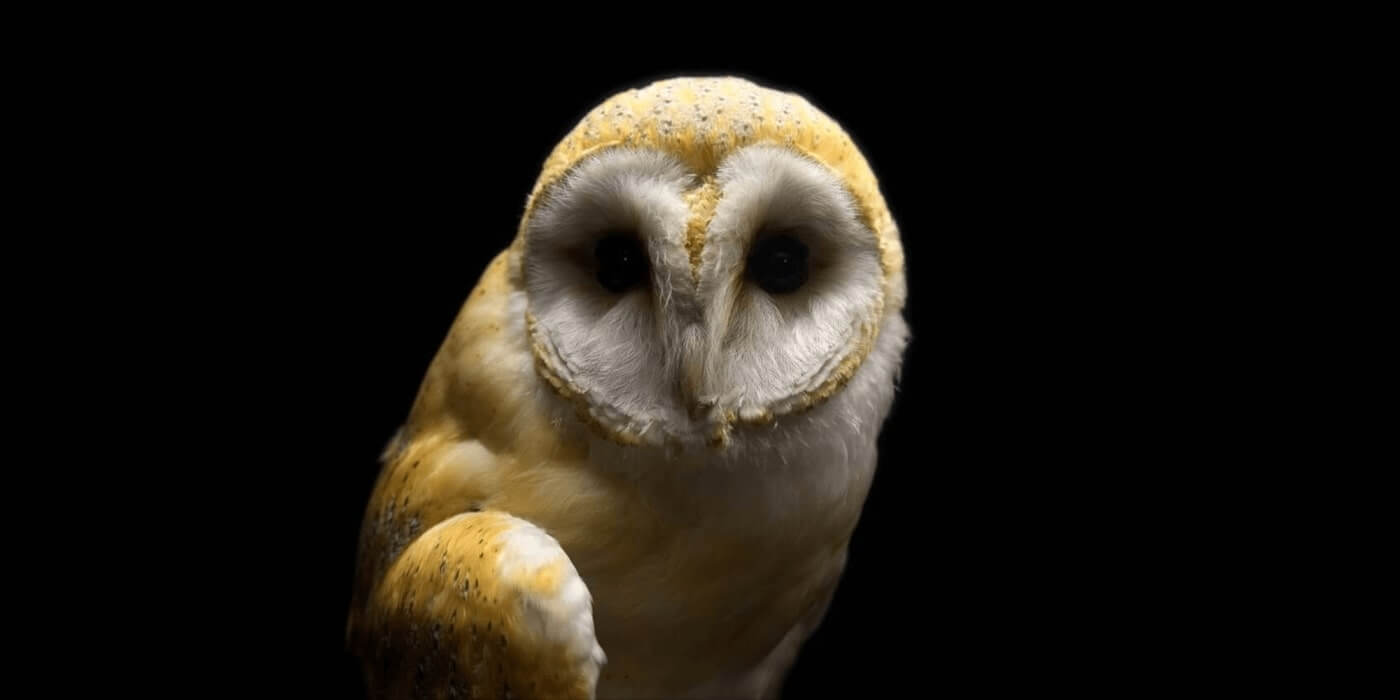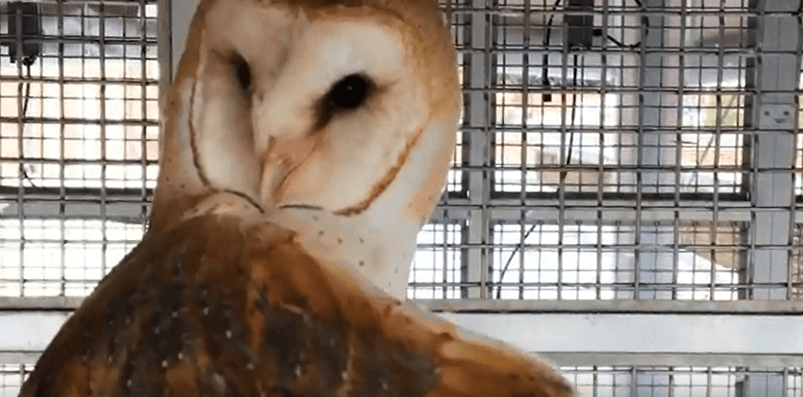Owls' Skulls Cut Open at Johns Hopkins University
It’s a barren, fluorescent-lit cinderblock torture chamber.

Update (July 11, 2022): If you’re an experimenter who cuts into and torments owls for a living, did so illegally for years, and was then barred by your state from killing those animals, your days of mangling owls’ brains should be over.
But not so in Maryland, where officials have just shamefully green-lit Johns Hopkins University’s deadly business as usual regarding the mutilation of owls on its campus.
PETA neuroscientist Dr. Katherine Roe issued the following statement:
Johns Hopkins University (JHU) is skirting Maryland law, with the complicity of the Maryland Department of Natural Resources (MD DNR), to continue invasive and deadly brain experiments on owls.
There’s no dispute that JHU broke the law by conducting these tests for four years without having mandatory state permits—and taxpayers have been footing the bill to the tune of $1.9 million. After PETA exposed this illegal activity, MD DNR issued a new permit, which JHU also violated by killing owls. The department then issued another permit that specifically barred the killing of these animals, which should have ended the experiments. However, it appears that MD DNR has now colluded with or bowed to pressure from JHU to circumvent the law by issuing the school a separate new permit that allows for business as usual. It’s not clear that this permit is legal, and PETA will be reviewing the situation.
JHU is also falsely claiming that experiments, which have resulted in no benefits to a single human, are important to the understanding of human autism, schizophrenia, and attention-deficit/hyperactivity disorder—almost throwing in the common cold—even though psychiatrists, neuroscientists, and people with common sense are saying that they absolutely are not. The experiments—which involve cutting into barn owls’ skulls, implanting electrodes in their brains, forcing the birds into plastic tubes or jackets so cramped that they can’t move their wings, clamping their eyes open, and bombarding them with sounds and lights for up to 12 hours—will continue for the present, despite their worthlessness. The National Institutes of Health’s (NIH) own analysis tool (“Translation” tab) indicates that JHU’s owl experiments have a shockingly dismal 5% “approximate potential to translate” to human health, and PETA caught experimenter Shreesh Mysore admitting that attaching bolts to animals’ skulls in order to hold their heads in an unnaturally fixed position might cause him to “misinterpret what’s happening or misunderstand” the results.
NIH must immediately cut funding for JHU’s experiments on owls or risk being complicit in the blatant corruption of science and the law.
If you haven’t done so already, please add your voice to ours by taking action below.
Update (June 16, 2022): After PETA informed Maryland state Senator Ben Kramer of the cruel, wasteful, and illegal activities conducted by Johns Hopkins University (JHU) owl experimenter Shreesh Mysore, the lawmaker sent powerful letters to the Maryland Department of Natural Resources (MD DNR), the National Institutes of Health (NIH), and JHU to demand an end to the torture tests on these sensitive birds.
Mysore—who from 2015 to 2018 failed to obtain mandatory permits to possess barn owls legally for use in his experiments and who admitted in his federal funding application his plan to kill the owls, even though doing so would void his legally required “Scientific Collecting” permits—has received more than $1.9 million in taxpayer money from NIH to mutilate owls’ brains.
Kramer asserts in his letters that Mysore is not exempt from Maryland law and should refund the taxpayer money he spent on illegal activities, be barred from receiving future federal funding for these experiments on owls, and have his current MD DNR permit revoked if he’s continuing to kill owls in his tests after that agency explicitly barred him from doing so on May 12, 2022. (See details below.)
Update (June 9, 2022): Victory! PETA has just obtained new documents from the state of Maryland that should end the torment of barn owls at Johns Hopkins University (JHU).
Earlier this month, PETA complained to the Maryland Department of Natural Resources (MD DNR) that the permit that the agency had issued to JHU experimenter Shreesh Mysore allowed him to kill owls after using them in invasive brain tests (see details below), pointing out that state law strictly forbids this practice.
The new documents confirm that MD DNR has revoked that permit because it was “inconsistent” with state law—in other words, ILLEGAL—and has issued him a new one stipulating that he can’t kill birds. Since killing them and examining their mutilated brains is how Mysore has been making a living, this should end his horrific experiments on owls.
We’ve written to the National Institutes of Health (NIH), which funds Mysore’s useless work, pointing out that he can no longer fulfill the terms outlined in his NIH grant application, in which he calls for killing the owls. So NIH, which has confirmed it’s currently investigating our complaint, needs to yank its support for these experiments, which have so far wasted more than $1.9 million in taxpayer funds. We’ve also written to JHU’s president with the same message.
Documents obtained by PETA reveal that Johns Hopkins experimenter Shreesh Mysore cuts into the skulls of barn owls, inserts electrodes into their brains, forces them to look at screens for hours a day, and bombards them with noises and lights—and pretends that doing this will tell us something about attention-deficit disorder in humans.

Funded by Johns Hopkins University and taxpayer money through the National Institutes of Health to the tune of more than $3.7 million, Mysore intends to use 50 to 60 barn owls in just the current set of painful experiments—including six birds simply for surgical practice for his staff.
What Shreesh Mysore Does to Owls
Mysore cuts into owls’ skulls to expose their brains. Then, he screws and glues metal devices onto their heads. The owls endure two to three invasive surgeries before Mysore uses them in experiments. These birds—who are nocturnal hunters who would fly great distances in their natural habitat—are forced into plastic tubes so cramped that they can’t move their wings while Mysore bombards them with sounds and lights and measures their brain activity. For some experiments, he restrains fully conscious owls for up to 12 hours.
During these experiments, he pokes electrodes around in the brains of the fully conscious birds, mutilating their brain tissue so severely that they become “unusable” to him—at which point he kills them.
Mysore admits that his experiments are painful for the owls, yet in his grant application for the experiments, he provides scant information on any pain medication that would be administered.
All the owls are killed at the end of the experiments.

Torturing Owls Does Nothing for Humans
“The evolved differences between owls and humans mean that Shreesh Mysore’s owl findings are highly unlikely to have any relevance to humans. Mysore attempts to promote a view that all animals are basically similar, referring on the Johns Hopkins website to ‘the brain,’ as if all species share a similar brain. Yet every lineage has undergone its own independent history of adaptation and specialization. Refusal to acknowledge species differences violates basic biological concepts.”
—Dr. Pandora Pound, independent research scientist
Mysore claims that his experiments could help humans, but, unlike us, owls have well-developed auditory and visual systems that are specialized for target selection. Bombarding these animals with artificial stimulation while their brain activity is measured in a distressing and completely unnatural situation does nothing to further our understanding of human attention-deficit disorder (ADD). Scientists who’ve gotten the memo that we’re in the 21st century are studying humans with ADD through sophisticated neuroimaging techniques—including functional MRI, positron emission tomography (PET), transcranial magnetic stimulation (TMS), and electroencephalography (EEG). In fact, data from these non-animal research methods have paved the way for current ADD treatments.
Tell Johns Hopkins University to end this torment now!
Please send polite comments to:
Ronald Daniels
President
Johns Hopkins University
[email protected]
Feel free to use our talking points below, but remember that using your own words is always more effective.
• JHU claims that Shreesh Mysore’s experiments on barn owls can help treat ADHD in humans—but studying the brains of trapped, terrified owls as they perform unnatural tasks has nothing to do with the disorder.
• Capturing these gentle creatures, confining them, and subjecting them to painful surgeries and unnatural tests is cruel.
• As a university that prides itself on being on the cutting edge of research, JHU should end worthless brain experiments on barn owls and redirect its resources toward effective, human-relevant, non-animal research methods.